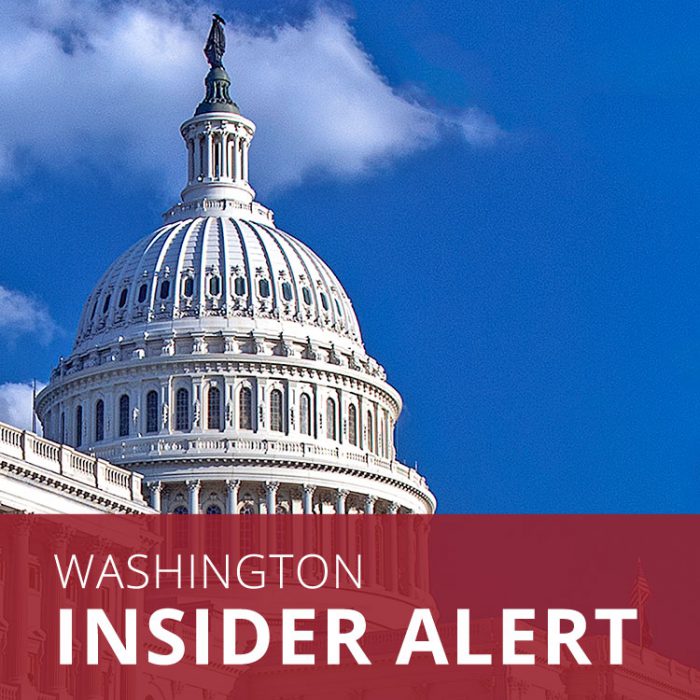Learning and professional development.


UPDATE: Congress passed the tax reform bill on December 20, 2017. The president signed the bill into law on December 22.
 DECEMBER 18, 2017 (WASHINGTON INSIDER ALERT) - On December 15, House and Senate leadership released the final compromise version of their tax reform legislation. The 1,097-page bill (with a 570-page joint explanatory statement) weathered a conference committee reconciling the differences in the House-passed bill and the Senate-passed bill.
DECEMBER 18, 2017 (WASHINGTON INSIDER ALERT) - On December 15, House and Senate leadership released the final compromise version of their tax reform legislation. The 1,097-page bill (with a 570-page joint explanatory statement) weathered a conference committee reconciling the differences in the House-passed bill and the Senate-passed bill.
While nothing is final until all votes are cast, the text of the compromise bill that was released after House and Senate negotiations preserves Section 127, Employer-Provided Education Assistance, and Section 117(d), Qualified Tuition Reduction. Thank you for all of your help reaching out to leaders on your campus and to your members of Congress. Our hard work and lobbying over the past year to save these important higher ed benefits appears to have paid off.
The compromise measure would also lower the corporate tax rate to 21 percent, almost double the standard deduction, and scale back the deduction for state and local taxes. With the final changes made, Republicans believe they have the votes to pass this new version through both the House and the Senate this week.
The House is expected to act first, as soon as December 19, and is expected to pass the historic measure with relative ease. The Senate is then expected to take up the compromise bill on December 20. Though Senate passage is expected, it will likely be with a razor thin margin that may require the vice president to step in and cast the deciding vote. Republicans were able to assuage concerns of a couple of members that threatened to vote against the bill with last-minute tweaks to the bill late last week. Sen. Marco Rubio (R-FL) threatened to vote against the bill, but was able to convince his Republican colleagues to expand the child tax credit enough that he will now reportedly vote for the bill.
Sen. Bob Corker (R-TN), the only GOP senator to vote against the Senate-passed tax overhaul bill, will now reportedly vote in favor of passage. Despite Republican leadership efforts to shore up the outstanding Republican votes, serious health issues plaguing two senators may preclude them from voting. Sen. John McCain (R-AZ), who is battling brain cancer, was hospitalized last week due to side effects from his treatment. Over the weekend, it was reported that he has gone home to Arizona to be with his family and likely will not return for a vote. President Trump reports that McCain is willing to return if Republicans need him, but Trump does not think they will need his vote for passage. Sen. Thad Cochran (R-MS) was also out last week undergoing medical treatment, but is expected to be in D.C. if needed.
If all goes according to the Republican plan, the president is expected to have the largest rewrite of the tax code passed by both the House and the Senate in time for him to sign the bill into law ahead of Christmas — some seven weeks after the initial House bill was introduced.
The final compromise measure is a mixed bag of improvements to either the House or Senate version, important tax provisions that had been threatened that were saved, and cuts and changes to other major tax provisions that could significantly impact the already tight budgets of colleges and universities. The impact will be different for each institution. The final bill, as it currently stands:
As noted above, the bill is 1,097 pages. We encourage higher ed HR leaders to work with their campus colleagues to fully understand the impact for their institutions.
For additional information on the provisions in the bill, actions by Congress and advocacy work by CUPA-HR and the higher ed community, please see the CUPA-HR advocacy tax page and the Higher Ed Community Tax Reform website.
This website uses cookies to understand your use of our website and to give you a better experience. By continuing to use our site or by closing this banner without changing your cookie settings, you agree to our use of cookies. To find out more about our use of cookies and how to change your settings, please go to our Privacy Policy.

